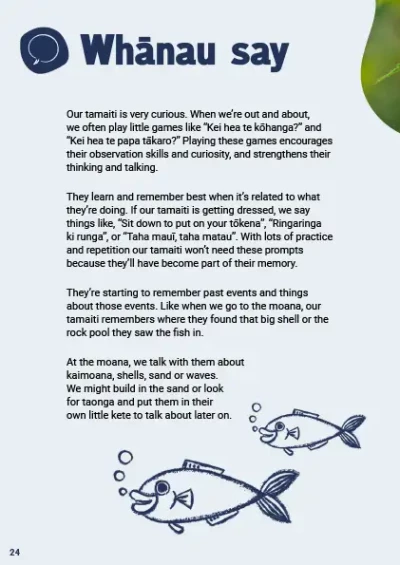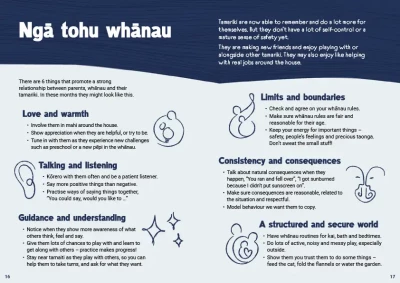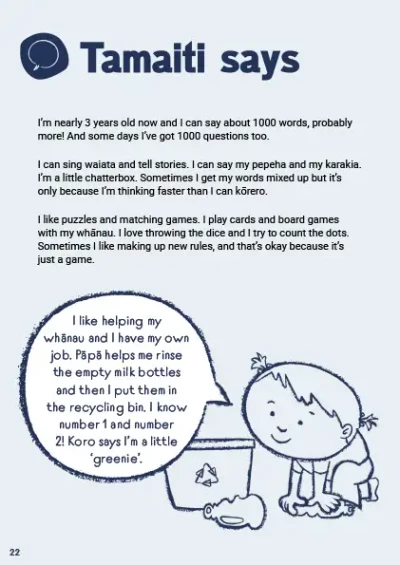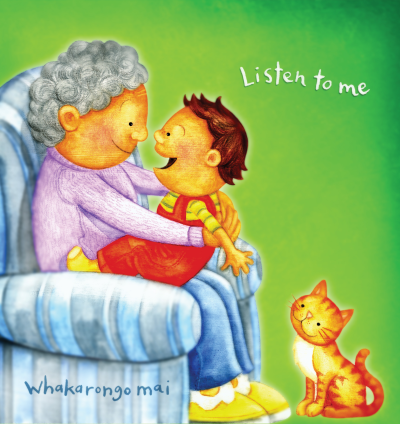
Lots of questions
When young children start to ask lots of questions it shows they are curious and want to understand their world. Whānau should encourage this through games and engaging with their questions.
Between the ages of 2 and 3, a child will probably start asking lots of questions. The most common question is usually ‘what’s that?’ This has been the question that’s helped build their vocabulary. So it makes sense that it will continue to be an important phrase for them to use.
They may also ask ‘Where?’ and ‘Why?’ as they are curious about the world and their enquiring minds need to know the answers.
These questions should be encouraged by the whānau. They are a sign that a child is exercising their curiosity, and this will feed their mind.
Sometimes children already know the answer to their question and it’s more about engaging adults in conversation. That’s why responding with ‘What do you think?’ or ‘Why do you think it’s happening?’ is the perfect response as it gives the child the chance to talk about what they know and gives whānau a chance to tell them how clever they are!
Question games
On page 24 of the Whakatipu booklet 'Te Kōhuri 2', Whānau say, 'Our tamaiti is very curious. When we’re out and about, we often play little games like “Kei hea te kōhanga?” and “Kei hea te papa tākaro?” Playing these games encourages their observation skills and curiosity, and strengthens their thinking and talking.'
Ask the whānau:
- What sorts of games do you play together?
- You might like to try some turn-taking question games. First, you ask a ‘where is?’ or ‘kei hea?’ or ‘I can see a … can you?’ question, then your child asks you.
- Would you be happy to try?
- What is your child curious about?
- How do you handle it?
What about other members of the whānau – do they encourage tamaiti to ask and answer questions?
Asking questions
On page 22 of the Whakatipu booklet Te Kōhuri 3, tamaiti says: 'I’m nearly 3 years old now and I can say about 1000 words, probably more! And some days I’ve got 1000 questions too.'
- How do you relate to this?
- What do you do when you feel your child is bombarding you with questions?
- What do you think would help?
- Can you remember what it felt like as a child, wanting to know something and people not listening to you?
The talking and listening principle on page 16 of Te Kōhuri 3 (Ngā tohu whānau) encourages parents to kōrero with their tamaiti often and be a patient listener.
Talking and listening to a child is a basic activity that strengthens relationships, as well as exercising the brain. Children may ask the same questions over and over again. This can feel irritating to whānau, but their tamaiti will find it reassuring to hear the same or a similar answer each time.
When tough things happen, like death or separation or other trauma, children will ask questions as they try to come to grips with the event.
Keep things simple – there’s no need to complicate matters with unnecessary details. There are no perfect answers, but it’s important to try to answer as gently, simply and honestly as possible.
Helpful resources for whānau
-
Why toddlers ask why?
What To Expect
Find out why children ask why and how to answer the many questions kids ask in this article on the What To Expect website.
-
Questions about death
BabyCenter
A BabyCenter article on some of kids most common questions about death, and guidance for answering them in a way that preschoolers will understand.















